
Chennai, With nearly 50 per cent of the business gone since the outbreak of coronavirus and the lockdown last year, the night curfew and ban on tourists visiting hill stations will further wipe out the restaurant business, said hoteliers in Tamil Nadu.
They also said the migrant labour going back to their homes is not a major problem as many of them who had left last year have not returned and further business has not improved.
"Normally business in vegetarian hotels pick up from 7.30 p.m. and in non-vegetarian outlets at 8 p.m. The night curfew between 10 p.m. and 4 a.m. announced by the Tamil Nadu government from April 20 will hit the business hard. Already restaurants are near empty after 7.30 p.m," R. Srinivasan, Secretary, Tamil Nadu Hotels Association told IANS.
With Covid-19 second wave hitting Tamil Nadu and increasing the number of active patients, the state government recently tightened the restrictions like night curfew, restaurants to operate with 50 per cent capacity, ban on tourists visiting hill stations and others.
"Already business is down by 50 per cent since last year Covid-19 lockdown. The ban on tourists visiting hill stations during the summer season sounds the death knell for the hoteliers there. The business done during the four months sustains them for the remaining part of the year," M. Venkada Subbu, President told IANS.
Continuing further, Subbu said nearly 25 per cent restaurants on the highways and 10 per cent of the city outlets have shut down business since the first lockdown.
The highway hotels may see some brisk business as long distance business that usually run at night are now operated during the day due to night curfew.
The Federation of Hotel & Restaurant Associations of India (FH&RAI) had earlier written to the Tamil Nadu government stating the prevailing restrictions and work from home arrangements, restaurants have no significant business during the day time and the imposition of night curfews is tantamount to closure of business for the sector.
On the issue of migrant workers going back to their home state with the imposition of recent restrictions and impacting the operations Srinivasan said: "Those who had gone back last year have not returned. As the business came down hotels managed with remaining hands."
The hotels trained their remaining staff on multitasking in order to be sustainable.
Subbu who runs the three star Darling Residency hotel in Vellore and several restaurants said the room bookings which went up to 30 per cent since October/November 2020 has come down to 10 per cent
Hotels across the categories in order keep their gas burners burning roped in Swiggy and Zomato online food aggregators last year.
In addition big star hotels had developed their own food ordering App and delivered their dishes at customer homes.
"The online food aggregators demand 20 per cent as commission which eats into our margins and is not remunerative. But in order to meet the fixed overheads outlets have signed up with them," Subbu said.
Hoteliers -- including four/five stars -- said they were seeing slight improvement in their business since November 2020 with room occupancy going up to about 30 per cent prior to the recent restrictions.
The room booking window which used to be several days prior to 2020 lockdown came down to 36 hours and now it is 24 hours, hoteliers told IANS.
"We are continuing with our arrangement with players like Swiggy and Zomato. We also have our own App. This enabled us to serve many new customers with our specialised offerings," Zubin Songadwala, General Manager, ITC Grand Chola and Area Manager, ITC Hotels, South.
"We will continue our association with Swiggy and Zomato. The one issue is that the per bill size has come down as compared to the size of dine-in bill," T. Nataraajan, CEO, GRT Hotels & Resorts had told IANS.
According to Songadwala, the bill size will be higher at restaurants as in most of the cases the corporate guests would go for beverages.
"In the case of home deliveries, the orders will be mainly for food," Songadwala remarked.


.jpeg)

